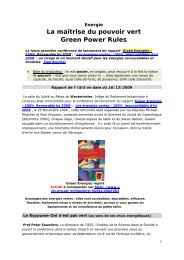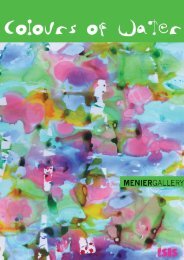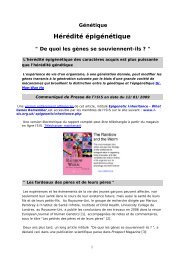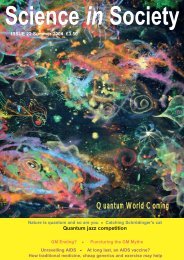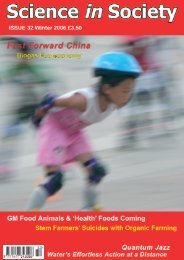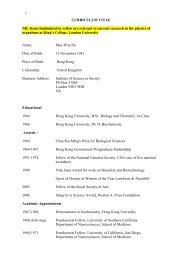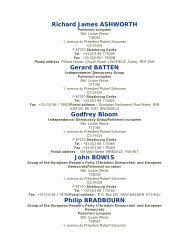Preview - The Institute of Science In Society
Preview - The Institute of Science In Society
Preview - The Institute of Science In Society
Create successful ePaper yourself
Turn your PDF publications into a flip-book with our unique Google optimized e-Paper software.
62Nature in an Urban Forest GardenAlex Smith, Alara CEOBehind Alara’s factory is a strip <strong>of</strong> land that until five years ago was disused and derelict. It was an eyesore and a healthhazard, filled with fly tipped rubbish and rubble and unpleasant detritus you might expect to find in dark corners aroundKings Cross.I decided enough was enough, and together with members <strong>of</strong> the local community (groups such as Terre MadreKing’s Cross), and after a huge amount <strong>of</strong> labour including removing over fifty tonnes <strong>of</strong> rubbish and 150 kg <strong>of</strong> Japaneseknotweed root, we have produced a wonderful organic Permaculture Forest garden and green space. Permacultureis the practice <strong>of</strong> using permanent food plantings as effectively as possible to produce as much food as you can andsequester the maximum amount <strong>of</strong> carbon. It is based on observing the natural world and working with nature.<strong>The</strong> garden has well over 50 different crop producing plants from Japanese wine berries, strawberries, and gooseberries, to ugni (Queen Victoria’s favourite fruit), pomegranate, sage and Goji berries. <strong>The</strong> garden is maintained by variouspeople and groups (over two hundred people have now worked there), the Alara staff, and me!<strong>The</strong> garden even produces honey (there are 4 beehives tended by a local beekeeper); but it is about much morethan just organic food production.<strong>The</strong> garden is very much an extension <strong>of</strong> what we are trying to achieve elsewhere in the company. It helps us tosequester CO 2, which is part <strong>of</strong> the bigger plan for Alara to become carbon neutral, along with compost bins and twowormeries to help us recycle food waste in our strategy to stay zero waste, an accreditation we have won numerousawards for.Perhaps most exciting is the garden allowing us to explore the centrality <strong>of</strong> food to life. Having a food garden putsus in touch with the miraculous processes that transform soil, air and sunlight into life and food.It is a true connection with the foundations <strong>of</strong> society and one that is now taken too much for granted. This connectionacts to both nourish body and mind and temper the integration <strong>of</strong> both.



